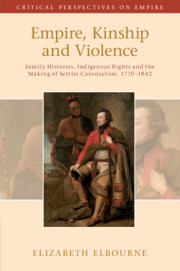 Empire, Kinship and Violence
Empire, Kinship and Violence Book contents
- Empire, Kinship and Violence
- Critical Perspectives on Empire
- Empire, Kinship and Violence
- Copyright page
- Contents
- Figures
- Maps
- Acknowledgements
- A Note on Nomenclature
- Abbreviations
- Introduction
- Part I North America
- 1 Before the Revolution
- 2 All the King’s Men
- 3 Land, Identity and Indigenous Sovereignty in British North America, 1783–1820
- Part II Upper Canada, New South Wales, Van Diemen’s Land, Victoria, Western Australia, the Cape Colony, Sierra Leone
- Part III Britain, the Cape Colony, West Africa
- Bibliography
- Index
2 - All the King’s Men
Kinship and the American Revolution
from Part I - North America
Published online by Cambridge University Press: 15 December 2022
- Empire, Kinship and Violence
- Critical Perspectives on Empire
- Empire, Kinship and Violence
- Copyright page
- Contents
- Figures
- Maps
- Acknowledgements
- A Note on Nomenclature
- Abbreviations
- Introduction
- Part I North America
- 1 Before the Revolution
- 2 All the King’s Men
- 3 Land, Identity and Indigenous Sovereignty in British North America, 1783–1820
- Part II Upper Canada, New South Wales, Van Diemen’s Land, Victoria, Western Australia, the Cape Colony, Sierra Leone
- Part III Britain, the Cape Colony, West Africa
- Bibliography
- Index
Summary
This chapter examines the American Revolution in the territory of the Six Nations and in colonial New York as an example of the shift in power to settlers and settler rejection of Indigenous modes of alliance that also typified the expansion of settler colonialism elsewhere. In borderland regions, the American Revolution was also a land war. Ethnic cleansing and warfare broke many of such fragile bonds of kinship (real and fictive) as existed between settlers and Indigenous peoples, even as the metaphor of brotherhood was important to Ranger groups in which Indigenous and settler soldiers fought together. Difference was entrenched through violence. Specific examples of the politics of kinship examined include nineteenth-century settler family stories about warfare, including stories about Joseph Brant, who was often taken as a symbol of settler relationships with the Six Nations; changing practices of captive-taking on the part of the Six Nations; complex relationships between white and Indigenous soldiers; and the breaking of kinship links between the Six Nations themselves, in which the Brants played a significant role.
Keywords
- Type
- Chapter
- Information
- Empire, Kinship and ViolenceFamily Histories, Indigenous Rights and the Making of Settler Colonialism, 1770-1842, pp. 70 - 113Publisher: Cambridge University PressPrint publication year: 2022
